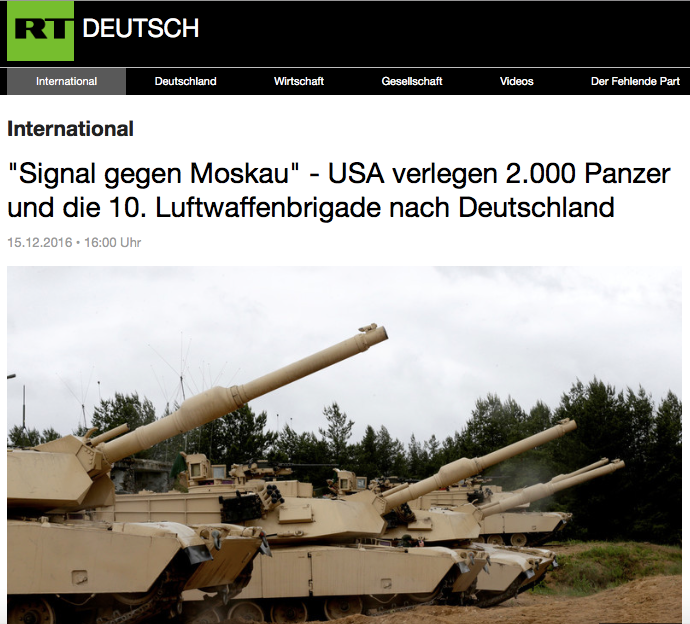|
|
Post by Bonobo on Jan 15, 2017 10:08:35 GMT 1
US sent some troops to European bases, including 87 tanks to Poland and the same number to Holland. That`s how the news was dealt with by Russian propagandists who blew 180 tanks into 3600. First was a local news portal  Later other Russian portals and agencies picked up and spread the false news   medium.com/@dfrlab/three-thousand-fake-tanks-575410c4f64d#.ah9aidx2z] medium.com/@dfrlab/three-thousand-fake-tanks-575410c4f64d#.ah9aidx2z]The articles ask a rhetorical question: Why do Americans deploy troops in Europe?    |
|
|
|
Post by Bonobo on Feb 25, 2017 20:26:39 GMT 1
Russian defence minister admits Kremlin has info warfare troops
23.02.2017 14:06
Russian Defence Minister Sergei Shoigu has said the country has set up a new branch of its military – information warfare troops.
News agencies reported that this is the first time the Russian authorities have acknowledged the existence of such soldiers.
Speaking to parliament on Wednesday, Shoigu was asked about the need to relaunch a counter-propaganda institution. He said that Russia already has information warfare troops.
The minister also said the troops are “more efficient” than the Soviet era counter-propaganda bureau.
The Russian RBK website quoted Frants Klintsevich, first deputy chairman of the Russian Federation Council's Committee on Defence and Security, as saying that the branch had been created “recently”.
“There are experts who expose [foreign] sabotage in electronic, paper and television media," he said. According to Klintsevich, such troops are also tasked with countering cyber-attacks.
Yury Baluyevsky, former First Deputy Minister of Defence and ex-Chief of the General Staff of the Armed Forces of the Russian Federation, was quoted by the RIA Novosti agency as saying that winning the information war in the current world situation might be more important than winning a traditional war.
He added: “Today, the information confrontation is pivotal, a war is ongoing for people’s minds.” According to Baluyevsky, winning the information war results in “paralyzing all of the enemy’s state organs of power”.
The previous US government accused Russia of cyber attacks during last year’s presidential elections in America.
At the beginning of January, during a Senate hearing, US intelligence services chiefs said that Russia poses a serious cyber threat to the US, adding that it had interfered with the elections aiming to increase Donald Trump’s chances of winning against Democratic contender Hillary Clinton.
The Kremlin has rejected accusations of manipulating the US elections.
|
|
|
|
Post by Bonobo on Apr 9, 2017 18:19:27 GMT 1
Russian propaganda discussed in Warsaw
29.03.2017 13:06
The issue of Russian propaganda in Central and Eastern Europe and the resulting threats was debated at the War Studies University in Warsaw.
The main organiser of the conference was Dr. Jerzy Targalski, a political scientist and historian, head of the Post-Soviet Sphere Research Centre at the University.
Opening the conference, Targalski said that Russian propaganda activities have spread to the countries of the former Soviet bloc.
He added that the Kremlin is currently investing more in information warfare and is giving it greater importance than traditional methods of waging wars.
“It just has a better rate of return, it is more effective,” Targalski told Polskie Radio.
Meanwhile, Viljar Veebel from the Estonian National Defense Academy, told the niezalezna website: “When you are being attacked, you exchange roles and go into offensive mode. We are still waiting, and Russians are constantly attacking. In certain situations, if you skip the first move, you will not have another one”.
During the lecture you mentioned that in the information war with Russia we are still a ‘responsive party’ and the time has come to go on the offensive. The problem is that in Poland, if someone talks about offensive actions against Russia, one is immediately excluded from public debate and is hailed as ‘a lunatic’ or a ‘russophobe’. Why is this happening?
Viljar Veebel: This involves, among other issues, the promotion system in the civil service. The situation in Estonia is similar to that in Poland. Government officials are convinced that they will be promoted if they do not make a mistake. And he who does nothing does not make mistakes. Therefore, if I see a Russian attack, I do not react and I hope someone else will deal with it. This is old thinking. In the current system we do not reward people who fight. We should change this thinking paradigm where action should be valued, and if someone breaks the rules he must bear the consequences. At this moment, cowards are promoted more than those who are active and are not afraid to fight.
Second, we must get rid of the thought that playing chess is bad. Normally, when you are being attacked, you exchange roles and go into offensive mode. We are still waiting, and Russians are attacking. In certain situations, if you skip the first move, you will not have another one.
Looking at the length of Estonia's borders with Russia, and that of Poland with Russia, we do not have the luxury of waiting for an attack. It is as if a heavyweight athlete beat a child. For us, the only thing that we can do is to change the target, dodge and attack immediately. As long as Putin is in power, there is no hope that Russia will stop. We must realise that [Russia’s] ultimate goal is to hit us.
|
|